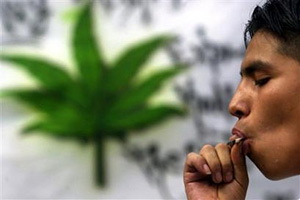 |
 |
 |
 Travel & Outdoors | May 2006 Travel & Outdoors | May 2006  
Bill to Ignore Casual Drug Use Worries Police, Tourism Operators
 Alicia A. Caldwell - Associated Press Alicia A. Caldwell - Associated Press


| | Alfredo, 19, smokes during a protest demanding a law that allows legal consumption of marijuana, Mexico City. Police and business owners from Mexico's beaches to border cities worried that a measure passed to decriminalize possession of cocaine, heroin and other drugs could attract droves of tourists solely looking to get high. (AP/Rodrigo Abd) |
Ciudad Juarez, Mexico – Police and business owners from Mexico's beaches to border cities say they are worried a measure passed by Mexico's Congress that decriminalizes possession of cocaine, heroin and other drugs could attract droves of tourists solely looking to get high.

Mexican and U.S. government officials insist that the bill eliminates legal hurdles to prosecuting drug crimes large and small. But it also lays out specific amounts of drugs – including marijuana, cocaine, heroin and Ecstasy – that can be legally possessed for personal use.

President Vicente Fox has yet to sign the bill, but his office praised it shortly after Congress approved it on Friday.

In Juarez, which borders El Paso, Texas, 58-year-old waiter Raul Martinez said Sunday he was worried “for the kids of Texas, the kids of Juarez. I worry for all the kids.”

Martinez, who works at the popular border-area bar the Kentucky Club, noted that American teens already swarm the city's bars and clubs because the Mexican legal drinking age of 18 is rarely enforced. He said he feared the new measure could lead youths to try hard-core drugs.

The legislation also confused some police.

“On one side, they're asking us to fight it,” said Jose Valencia, a police officer in Mexico City's tourist-oriented Zona Rosa district. “On the other, we have to allow consumption.”

Currently, Mexican law leaves open the possibility of dropping charges against people caught with drugs if they can prove they are drug addicts and if an expert certifies they were caught with “the quantity necessary for personal use.” The new bill drops the “addict” requirement, allows “consumers” to have drugs and sets out specific allowable quantities, which do not appear in the current law.

Under the bill, people would be allowed to posses 2.2 pounds of peyote, the button-sized hallucinogenic cactus used in some Indian religious ceremonies. Police would also no longer bother with possession of up to 25 milligrams of heroin, 5 grams of marijuana or 0.5 grams of cocaine – the equivalent of about 4 “lines,” or half the standard street-sale quantity.

The law lays out allowable quantities for a large array of other drugs, including LSD, MDA, MDMA (Ecstasy, about two pills' worth) and amphetamines.

However, the bill stiffens penalties for trafficking and possession of drugs – even small quantities – by government employees or near schools, and maintains criminal penalties for drug sales.

And sales of all those drugs would remain illegal.

A former Pentagon anti-drug official, Ana Maria Salazar, said the law would make it easier to convict street-corner drug pushers and more difficult for people to bribe judges and prosecutors, who now have discretion in deciding what quantity of drugs are for “personal” use.

“All of those who think this legalizes drugs in Mexico, not only are they wrong but they are going to get in a lot of trouble if they come here and try to use drugs,” said Salazar, now a political and security analyst in Mexico City. “It's designed to go after the smaller groups of drug smugglers.”

U.S. Embassy spokeswoman Judith Bryan agreed the measure could actually make it easier to prosecute drug crimes because it attempts to “precisely specify the amount of narcotics in possession of a suspect to allow a criminal prosecution.”

But some fear the new measure could make drug-related violence worse in places like Nuevo Laredo, a city across the Rio Grande from Laredo, Texas, which has been terrorized by deadly battles between rival drug gangs. Since Jan. 1, there have been 92 killings in the city of 330,000, including eight police officers.

“Here things are very tense and many of our compatriots have died,” said a police officer who asked only to be identified as Jose. “What will happen if we have to concede them the right to use drugs?”

Shining shoes for tourists, Elipio Rodriguez said drugs were already everywhere in Nuevo Laredo.

“There by the bridge (to the U.S.) anyone can do drugs,” he said. “Police always patrol there, by those who are selling, and nothing ever happens. Do you think something will change now?”

Associated Press reporters Jorge Vargas in Nuevo Laredo, Jorge Dominguez in Cancun and Alan Clendenning and Will Weissert in Mexico City contributed to this report. | 
 | |
 |



